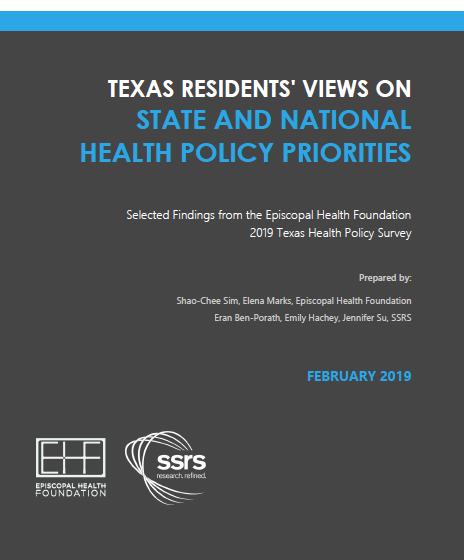Top Headlines from poll results:
-
Majority of Texans say state legislature should make health care spending a priority & play role in making sure health system works
-
Texans’ top health priorities for lawmakers: lowering price of prescription drugs, lowering health care costs, and increasing access to health insurance
 View the complete
View the complete
2019 Texas Health Policy Poll Report
The survey finds nearly nine in 10 Texans (88%) say they think health insurance companies should be required to provide coverage for people with pre-existing medical conditions. The results include 93 percent of Democrats, 89 percent of independents, and 82 percent of Republicans who say coverage of pre-existing conditions should be mandatory.
An overwhelming majority of Texans also think state government has a role to play in making sure the health care system works well. Nine in 10 (91%) say the state should play a major or minor role in a functioning health care system. A smaller percentage of Texans (82%) said that the federal government has a similarly important role in the health care system.
When it comes to overall spending priorities for state government, more than half (54%) of Texans say the state should increase spending on health care – similar to the shares who say the same about public safety (54%) and infrastructure (53%). The survey finds Texans only say they favor increased spending on public education (69%) more than health care.
“Texans are looking directly to state leaders to help solve some serious health care problems,” said Elena Marks, president and CEO of the Episcopal Health Foundation. “Whether it’s protecting coverage for pre-existing conditions or getting access to affordable care, it’s clear Texans want state lawmakers to do more to make the health care system work better, especially for those who need it the most.”
Majorities of Texans say top health priorities for the state legislature should be lowering costs of prescription drugs (60%), lowering health care costs (59%), increasing access to health insurance (57%), increasing funding for mental health programs (53%), and reducing the number of women who die from causes related to pregnancy or childbirth (51%).
Other key survey results:
- Almost six in 10 Texans (59%) say state government is not doing enough to help low-income adults access the health care they need
- Nearly two thirds (64%) support Medicaid expansion in Texas
- More than one third of Texans (35%) did not know if Texas had expanded Medicaid under the Affordable Care Act and 18 percent mistakenly believe that the state did expand the program
- Fewer than three in 10 (28%) Texans knew that the uninsured rate is higher in Texas compared to every other state and 20 percent of Texans thought the state had a lower uninsured rate than other states
These findings are the first report in a series drawing on a 2019 EHF survey of Texans on their views of health policy and experiences with health care costs. In 2018, EHF partnered with Kaiser Family Foundation for a similar survey and series of reports. Future reports will look at health care costs, access and experiences of the uninsured in Texas.
Methodology
SSRS, an independent research company from Glenn Mills, PA, conducted the second wave of the Texas Health Policy Survey on behalf of Episcopal Health Foundation (EHF) from January 3 through January 25, 2019. The goal of this survey was to detail the attitudes and experiences of Texas adults regarding their health care, with a comparison to a similar study completed in 2018. For the Texas Health Policy Survey, SSRS interviewed a representative sample of 1,210 Texas adults (age 18 or older), reached via landline (n=345) and cell phone (n=865) random digit dialing (RDD). Sample was provided by Marketing Systems Group (MSG). Interviews were conducted by professional telephone interviewers in English or Spanish based on the respondent’s language preference. Weighting is generally used in survey analysis to compensate for sample designs and patterns of non-response that might bias results. The survey data are weighted to balance the sample demographics to match estimates for the Texas adult population. The margin of sampling error for this study is +/- 3.6 percentage points for results based on the total sample.
###
To schedule an interview, contact Brian Sasser, EHF’s chief communications officer, at bsasser@episcopalhealth.org or 832-795-9404 cell.